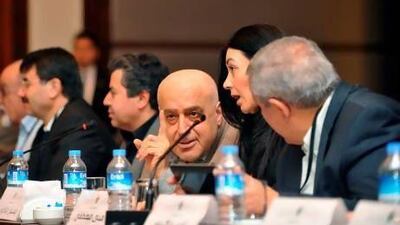ISTANBUL // Syrian opposition activists met in Istanbul yesterday to elect an interim government for those regions of Syria no longer under control of president Bashar Al Assad after two years of fighting that has killed 70,000 people.
An interim government would represent a major step towards unity for the fractured Syrian insurgency. But it remained unclear yesterday what concrete powers such a government would have on the ground, where a multitude of militias and groups are fighting Mr Al Assad's troops, and whether it would seek peace negotiations with Damascus.
Assad Asseq Mustafa, a former Syrian agricultural minister and governor of the central Hama province, emerged as a front-runner among 12 candidates for the post of interim prime minister, delegates of the closed-door meeting said. Ghassan Hitto, an information technology specialist activist, was also a strong contender, they said.
Both Mr Mustafa and Mr Hitto live in Turkey, a former partner of Syria that has emerged as a leading critic of Al Assad's regime and supporter of the opposition on the international stage.
As the two-day conference started at a hotel near Istanbul's main airport, delegates of the Syrian National Coalition (SNC) received support from General Selim Idris, the commander of the rebel forces in Syria. "We will work under the command of this government," Gen Idris told a news conference yesterday. "We take responsibility to protect the government inside the liberated areas," he added. "We need this government as soon as possible to support our people in the liberated areas."
Gen Idris repeated his call for weapons from western countries and insisted the rebels were able to ensure that arms would not fall into the hands of extremists, a major worry in Europe and the US. Weapons from abroad would only go to rebel "brigades who are very disciplined", he said.
The Istanbul meeting was postponed twice in recent weeks over differences within the opposition about who should lead the rebel government.
There have also been disagreements about the conditions for possible peace talks between the opposition and Mr Al Assad's government. SNC president Moaz Al Khatib told a Turkish newspaper this month whether Mr Al Assad would take part in talks was a mere "technical detail".
But Halit Hoca, the SNC's Turkey representative, said yesterday all participants in Istanbul agreed that negotiations could only involve members of the Syrian government who had not been involved in the crackdown on the opposition and that Mr Al Assad himself should be excluded from such talks.
Khalid Saleh, an SNC spokesman, said that the process to elect the prime minister started yesterday, but that it was unclear whether the vote itself would take place later in the day or today.
Delegates yesterday reviewed the candidates, Mr Hoca said.
The leader of the interim government should be a strong administrator with the ability to coordinate aid and solve administrative issues for the "liberated" areas in Syria's east and north, he said. "Those areas include things like education, health and also the military."
Rushing back to the conference room after a short break, Mr Mustafa confirmed his candidacy. "If I last another hour," he added with a smile, in reference to the grilling the candidates were facing from members.
Among the other candidates were Osama Kadi, the SNC's economic adviser from Canada, and Walid Al Zoabi, a real estate entrepreneur from Dubai. Mr Hoca said some of the candidates were living inside Syria, but their names were not immediately available.
He said SNC chief Mr Al Khatib would serve as interim president with the power to set broad policy guidelines once the transitional government has been created, while the prime minister would be responsible for administrative work.
tseibert@thenational.ae

